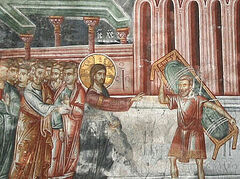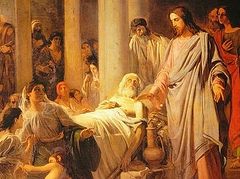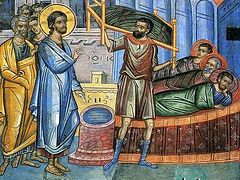
Christ is Risen!
Today, on the fourth Sunday of our continuing Paschal joy, we remember the miracle of healing by our Lord Jesus Christ of the paralytic—a paralyzed man who spent thirty-eight years seriously ill. Like many other of the sick—the blind, the lame, the withered—he was located at the pool called in Hebrew Bethesda, which means, “house of mercy”, “a place of grace, healing”. This pool was located in Jerusalem by the Sheep’s gate, through which most probably the sacrificial animals were driven into the temple—or perhaps near these gates was a market where oxen and calves, sheep and goats were sold for the whole burnt sacrifice, a sacrifice of peace, sacrifices for sins, or guilt sacrifices. The pool of Bethesda was also used as a water reservoir for the citizens of Jerusalem, and as a place where the sacrificial animals were washed. The ecclesiastical historian Eusebius Pamphilus writes at the beginning of the fourth century that “Bethesda is a pool in Jerusalem; it is the Sheep’s Pool, which had in antiquity five porches, and now it is seen in two pools located there, one of which is filled with the annual rains, while the other has miraculously red-colored water, retaining a trace, as they say, of the sheep washed there, from which it gets the name Sheep’s pool, by reason of the sacrifices.”
Water from this pool where they washed the animals selected for sacrifice to the One God was miracle-working, when an angel went down at a certain season into the pool, and troubled the water: whosoever then first after the troubling of the water stepped in was made whole of whatsoever disease he had (Jn. 5:4).
We know, dear brothers and sisters, how unpleasant and hard it is when in a holy place—in the Lord’s church—instead of love and mutual respect, magnanimity and reverence for sanctity, we see audacity and brusqueness, people pushing forward with the desire to be first to the Holy Chalice or to venerate the cross. So just imagine what it meant to see that same disregard for a holy place for thirty-eight years—the attitude of total egotists, limited consumers not only of earthly goods, but even daring to seize spiritual goods in the most unruly manner. Those again coming for the miracle of healing were still unable show magnanimity and compassion for one paralytic, to yield their place in line to him, and help him be immersed in the waters of Bethesda. Those waiting for the movement of the water (Jn. 5:3) forgot about the most important of God’s commandments—to love God and your neighbor.
The philosopher Diogenes was right when he wandered around in broad daylight in crowded squares and streets with a lit torch, saying, “I am looking for a Man.” The paralytic whom we remember today was also unable to find a man to help him, until the God-Man Himself came to him—Jesus Christ. Helping all those in need and waiting with faith for help from God, but especially those people who were poor in spirit (Mt. 5:3), he heals the paralytic with only the words: Rise, take up thy bed and walk (Jn. 5:8).
And the formerly sick man precisely fulfilled the words of his Healer—he did what was forbidden to do by a righteous Jew, to carry something on the Sabbath day; he does this “so that [those of little faith] would not consider this action (that is, the miraculous healing) to be something phantom”[1] and deceptive. He takes the bed (which was most likely a mat or rug), on which he had lain by the pool for thirty-eight years, and walks with it through Jerusalem.
But where did this ban on carrying things on the Sabbath come from? In the book of Exodus we read, And it shall come to pass, that on the sixth day they shall prepare that which they bring in; and it shall be twice as much as they gather daily (Ex. 16:5). On the eve of the Sabbath, the sixth day, the Jews who wandered in the desert after passing through the Red Sea had to gather twice as much miraculous manna, because there wasn’t any on the seventh day, and it couldn’t be gathered any other day. Thus did the Lord teach His stiff-necked people devotion to Himself and faith in God’s care for His faithful creation. With time, the Jewish lawyers decided that only what had been prepared earlier for the Sabbath could be taken from one place to another on that day. Things that had not been prepared for the Sabbath fell under ban due to simple caution: in taking things and instruments specially intended for some activity from one place to another, a person could forget and use them according to their direct purpose. Therefore, the lawyers permitted them to be carried only in order to be used exclusively to complete a permitted action; for example, if there is nothing on hand to crack a nut, then a hammer could be used. But to carry objects for other purposes was not permitted. Thus, for example, if before the Sabbath that same hammer was forgotten in a place where it could be lost or broken, it was not permitted on the Sabbath to take it to a safer place.
The paralytic of course knew this rule, but as a man who was thankful to his Healer, the higher righteousness would be to fulfill unconditionally and without deceit Christ’s words: Arise, take up thy bed and walk. And so, he takes up his bed like a cross, knowing that he will be judged and cruelly punished by the false righteous ones and observers of pious rules. But for the elders and lawyers, the healing of the paralytic was too insignificant and viewed only as one of the many ways to cause pain and harm to the Lord Jesus Christ; to the lawyers, he was a representative of a people that knoweth not the law and are cursed (Jn. 7:49). And they expected the healed paralytic to remain paralyzed in soul just as they were; that after thirty-eight years he would have grown resentful against the indifferent and cruel people and no longer trust them or behave nobly.
The Jewish lawyers did not know that in the crucible of sorrows, in times of sickness, in a man’s soul “is born the virtue that is hard to obtain in a peaceful life alien to suffering”.[2] Suffering worketh patience; And patience, experience; and experience, hope: And hope maketh not ashamed; because the love of God is shed abroad in our hearts by the Holy Ghost which is given unto us (Rom. 5:3–5). And a person who has come to know God’s love will bring it out to people, and there will be no evil remembrances in his heart, but rather compunction and quiet joy.
Compunction, dear brothers and sisters, is always the first sign of healing from spiritual paralysis, from paralysis of the soul. It is a “feeling a person has of mercy and compassion to himself, to his own disastrous state, his fallen state, a state of eternal death.”[3]
At the Jews’ question, What man is that which said unto thee, Take up thy bed, and walk? the healed paralytic gives no answer, because he didn’t know who He was (Jn. 5:12–13). The Lord had conveyed himself away, a multitude being in that place. Then He again meets the healed man and gives him advice—a commandment: Behold, thou art made whole: sin no more, lest a worse thing come unto thee (Jn. 5:14). And only then does the paralytic understand Who healed him, and the one who had earlier taken up his bed on the Sabbath like a cross, as a sign of faithfulness to God and dedication, readiness to serve Him, disregarding the complexity and danger, goes to the Jewish elders.
Of course, the elders and lawyers were expecting this, for the simple people respected and obeyed them, and they expected the paralytic to give the name of Christ as the name of the One Who had commanded him to violate the commandment by carrying things on the Sabbath, thereby mocking something holy, and worthy of punishment. By baseness and betrayal the healed paralytic could have saved himself from punishment.
But “one who was sick knows the value of health,” says the great ascetic, St. Isaiah the Anchorite, and therefore never does evil to his enemies. And instead of betrayal the paralytic bravely and openly testifies before the hosts of hypocrites that his Healer is Jesus Christ; that it was He Who worked this miracle, which we remember today.
Bodily paralysis can happen to any of us, dear brothers and sisters, and we don’t always know the cause. But we know the cause of paralysis of the soul, the paralytic state of all our powers of the soul: It is our sinful life. According to St. Mark the Ascetic, this illness is formed from three sinful components: ignorance with forgetfulness, laziness with carelessness (despondency), and stony insensibility.
Knowing how widespread this state is among people, the Holy Church suggests to us that we ask God every day for help in the struggle with paralysis of the soul: “Deliver me, O Lord, from ignorance, forgetfulness, despondency, and stony insensibility.”[4] The means against paralysis is only prayer and patience. And if during prayer “we feel insensibility, then regardless of this state of insensibility, it is useful to force ourselves to pray with attention and not slacken our labor of prayer; we should pray aloud and unhurriedly, because after insensibility the grace of God suddenly touches the heart—and it comes in compunction.[5] And then consolation comes from God.
Let us continually “be sober against the spirit that brings sorrow upon a person—the spirit that casts many nets in order to snare us and commit to paralysis.”[6] Let us be attentive to our neighbor who needs our help. Let us be magnanimous and reverent toward holy things. Let’s not wait for the movement of the water and other miracles, but let us await the Kingdom of God and prepare ourselves for it, glad for the paralytic who was healed by the Lord; and being consoled that:
Christ is Risen!



